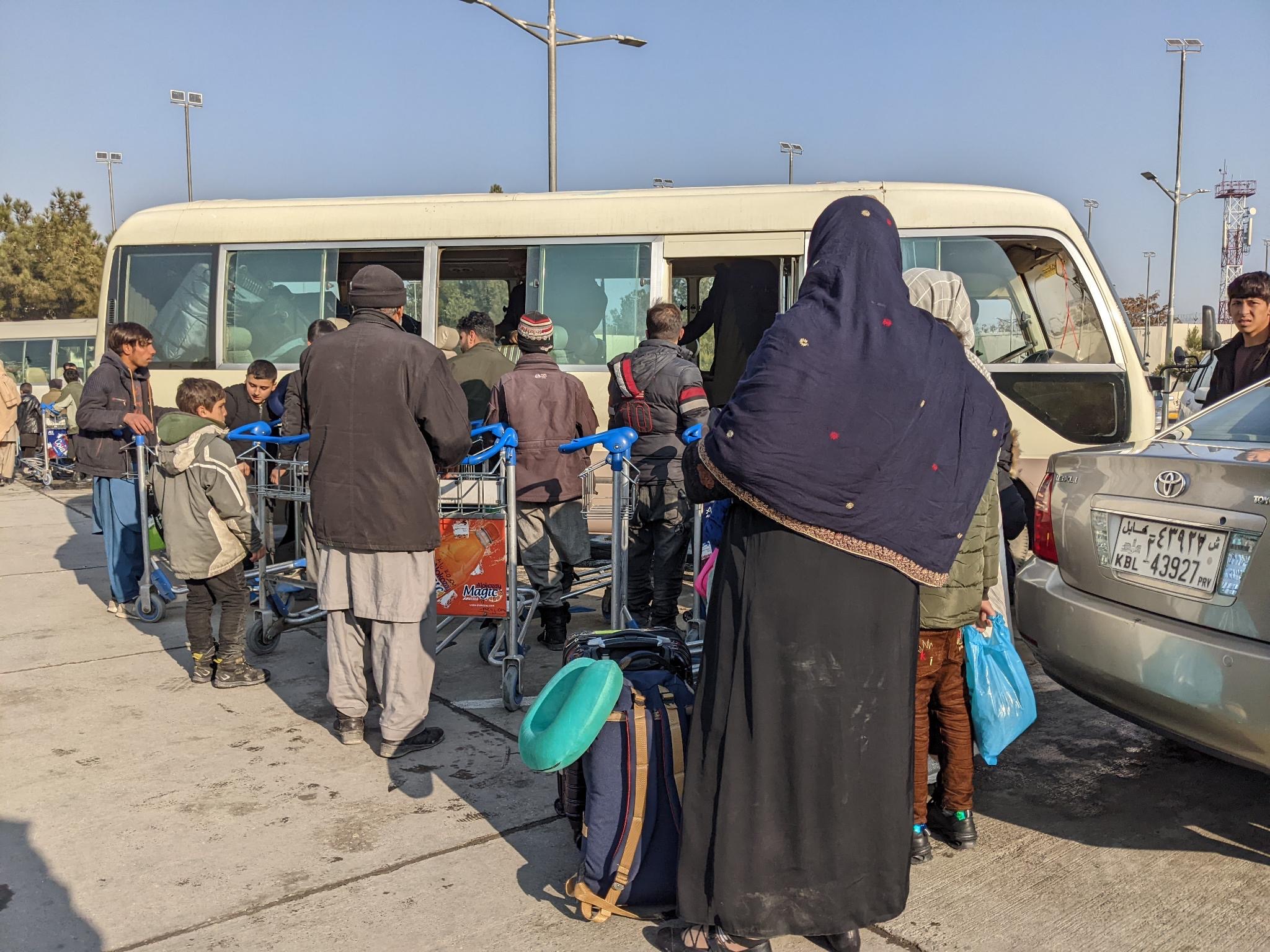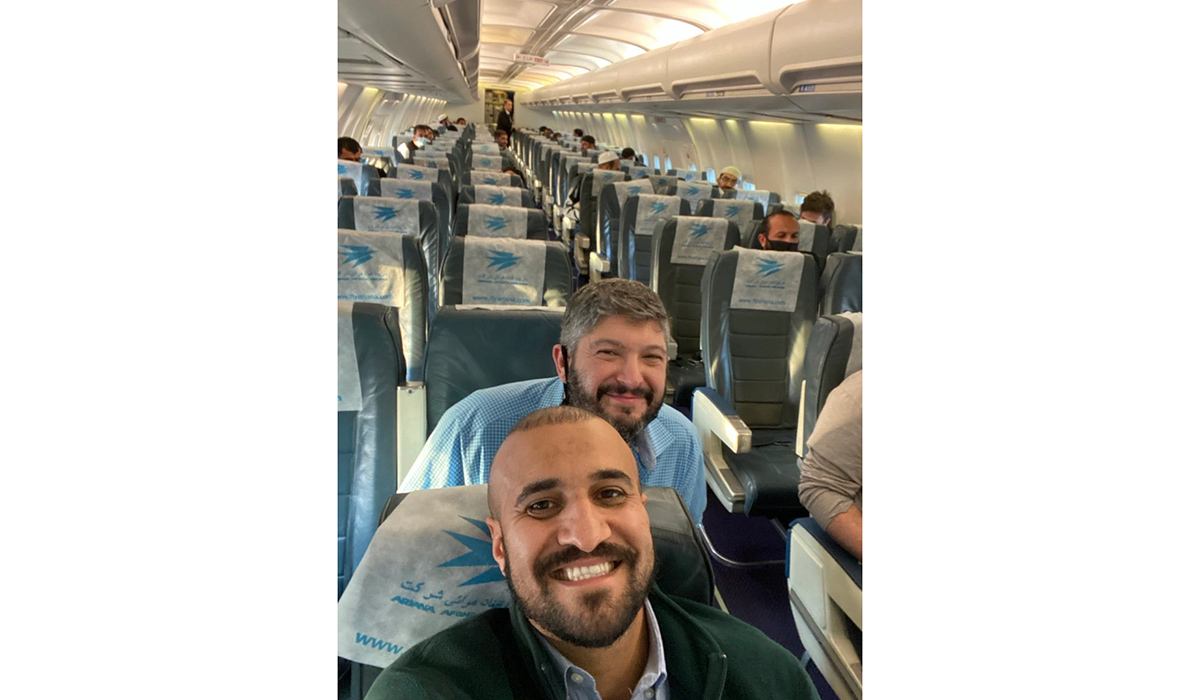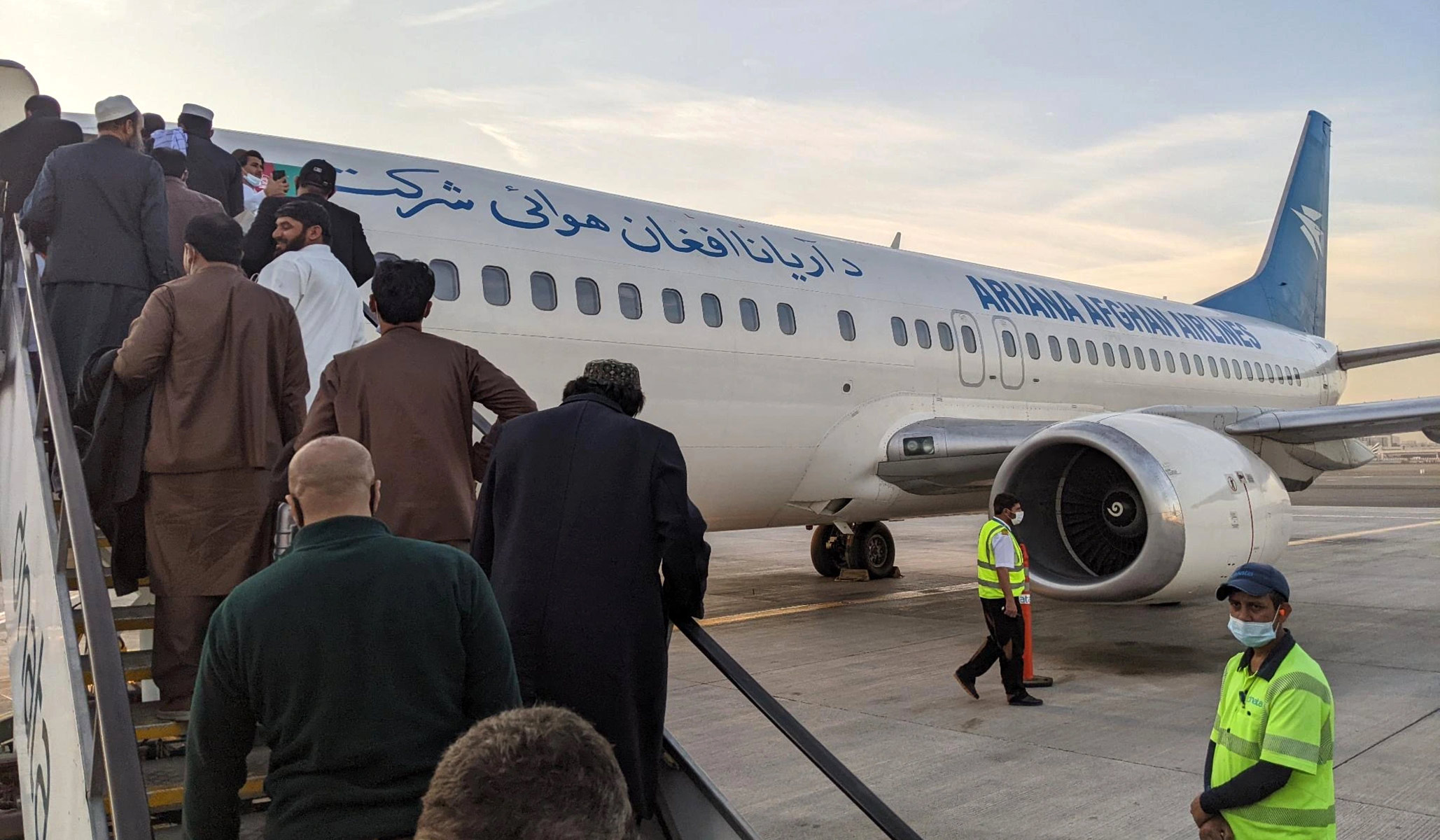Breaking: State Department ‘Actively Impeding’ Rescue Efforts as Afghanistan Fades from Spotlight, Vets Say
In mid December, Bryan Stern and two of his colleagues did something few Americans have done since late summer – they flew into Afghanistan. Their goal was to rescue 47 American citizens and permanent residents stranded in the Taliban-controlled country.
Once on the ground in Kabul, Stern and his colleagues with the civilian rescue organization Project Dynamo gathered with their evacuees in safehouses, making sure everyone had a negative Covid test, and had all their vaccinations and travel documents. The next day, the group traveled to the airport, boarded three commercial planes and flew to New York, via Dubai.
"Every one of them has been trying to leave since August," Stern told National Review of this newest batch of Afghanistan evacuees his volunteer group rescued. "Grown men and fathers cried on my arm when we went wheels up."
Project Dynamo negotiated for seats on the planes for the people they rescued. Stern vowed to continue with the operations. "As long as we're funded," he said, "we're going to keep going."
The Project Dynamo rescue came four months after the fall of Kabul, as winter is setting in, and as Afghanistan is on the brink of mass starvation. It also came as successful rescues of Americans and American allies have become increasingly hard to come by.
Stern has focused his most recent efforts on rescuing American citizens and green-card holders, people who can fly commercially to the United States. But efforts by dozens of private rescue groups who have focused their energy on saving other American allies in the 20-year war – people who typically don't have the paperwork for a direct path into the U.S. – have slowed to a crawl.
Leaders of some of those groups who spoke to National Review are pointing fingers at the U.S. Department of State. They say the State Department is doing little to help them rescue American allies, and in some cases it is actively blocking their efforts. They're calling on President Joe Biden's administration to do more to help them save the people they once served with.
At the same time, as the Afghanistan rescue efforts have fallen off the newspaper front pages and nightly news broadcasts, fundraising has been increasingly difficult. Because many groups haven't been able to get flights out for weeks or months, they've struggled to keep up with their bills to keep prospective evacuees fed and sheltered in safehouses. Some group leaders say they're draining their own bank accounts to keep their efforts afloat.
"It's really demoralizing on the one hand, and it's infuriating on the other," said Jesse Jensen, a former Army Ranger, cofounder of the civilian rescue group Task Force Argo, and a Republican congressional candidate in Washington.
"We've made a promise to some of these people that we were going to get them out. If you serve with the American government, we will extricate you, we will provide you with an immigrant visa that you will be able to come to the United States and live. And we're not honoring that."
In an email to National Review, a State Department spokesman said the agency is grateful to its governmental and non-governmental partners, and appreciates the desire of private citizens to assist with the evacuation efforts. The State Department said it has established a team to coordinate across government agencies, and with other advocacy groups and nonprofits on the effort to evacuate American citizens, permanent residents, and American allies.
"We have been evaluating requests for assistance on a case-by-case basis to support privately organized flights," the spokesman said. "This support involves evaluating the passenger manifest provided to us by the private group or groups organizing these flights to see which proposed passengers, if any, are potentially eligible for permanent resettlement in the United States through some affiliation with the U.S. government."

'None of Us Are Going to Quit'
From late August to late October, Task Force Argo helped rescue more than 2,000 people from Afghanistan and got five flights out, Jensen said. Since then, their efforts have been stymied.
"We have three flights that are fully paid for, with 1,200 souls, that have been grounded for eight weeks, because we do not have a country in which to send these people" he said. Jensen said the State Department "has constantly changed the standards and process to move evacuees out of Afghanistan" since the military's the August 31 withdrawal.
At one point, Jensen said, his organization negotiated 1,000 beds with a third-party "lily-pad country" to place their evacuees, but the state department "stole those beds from us" so they could resettle a separate group of evacuees who had initially been sent to Germany.
"The Germans were like, 'We're not going to keep these people. You need to get rid of them,’" Jensen said, alleging that a state department official reached out to his organization and said, "we need those beds, but it has to be your idea. It can't come from us."
The State Department declined to address Jensen's allegation in its email to National Review.
According to public statements, the State Department claims it's continuing its "around-the-clock efforts" to relocate U.S. citizens, permanent residents, and Afghan allies and their families. Secretary of State Antony Blinken said at a late December press conference that the U.S. led an international coalition that has evacuated more than 120,000 people from Afghanistan. "We knew this would be challenging. It was," Blinken said.
The State Department says fewer than a dozen U.S. citizens remain in the country who wish to leave.
Leaders of the private rescue groups who spoke to National Review acknowledged that the U.S. government has made slow progress evacuating American citizens and permanent residents, but they said they see little evidence of a plan to rescue other American allies in the war, including allies with Special Immigrant Visas and soldiers who fought alongside Americans.
"I don't think the current administration has any intentions of ever evacuating the men that fought and bled next to us, and their families," said Ben Owen, the chief executive of Flanders Fields, an organization originally founded to help homeless veterans. Flanders Fields also joined the Afghanistan relief efforts over the summer.
Owen estimated there are easily over 100,000 American allies still trapped in the country. He noted that former Afghan national army commandos don't qualify for SIV status.
"They get nothing. The U.S. government doesn't see any duty to evacuate these guys. And they are dead. They are dead. They are dead if they get caught. I've had three executed in the last two weeks, one in front of his wife and children," Owen said. "None of us are going to quit until we find a way to get them out. These guys, they fought like hell."
The difficulties of fleeing Afghanistan in the winter are compounded by weather – airports don't have machines to de-ice planes, and workers have to shovel snow by hand from runways. Fleeing by land is complicated because the borders of Turkmenistan, Uzbekistan, Tajikistan, and China are closed.
Owen said that while the Taliban has temporarily stopped all charter flights out of Afghanistan, the biggest hurdle for most of the private rescue groups is that the State Department is not issuing what are known as "no objection certificates," essentially letters to potential third-party countries stating that the U.S. government won't object to them temporarily taking in evacuees. Kosovoa, Albania, Rwanda, and Greece are among the countries that have demonstrated a willingness to work with private rescue organizations and the U.S. government, rescue group leaders said.
"All these countries are asking for is the U.S. Department of State, through an embassy in their country, to say, 'Go ahead. We don't care if you do this. We're not going to help you do it, but we're also not going to hinder your effort to do it,'" Owen said, adding that those countries are instead being told that if they accept evacuees from the private rescue groups they could be accused of facilitating human smuggling. "It's incredibly frustrating to all of us."
The State Department, he said, is "actively impeding our efforts to find third countries to accept flights of Afghans."
Stern said in the State Department's defense that vetting and evacuating people is hard work, "but we put a man on the moon. How hard could this be?" He said the State Department hasn't actively impeded Project Dynamo's efforts, "but they're certainly not helping. Their position is, because we're not contracted with you, we can't and won't help you."
Last month, a coalition of veterans and rescue groups sent an open letter to President Joe Biden and leaders in Congress calling on them to take 15 steps to improve the evacuation efforts. Among the steps they called for are: developing a "multi-year, actionable plan" for evacuating Afghan allies; negotiating with other countries to establish, maintain, and support multiple so-called "lily-pad" locations where evacuees can be sent before a permanent location is established; authorizing virtual visa interviews; waiving humanitarian parole fees; and offering mental health support for evacuated Afghans and American volunteers.
In the email to National Review, the State Department said there have been "significant challenges" with some of the privately-organized flights. One of the troubles, according to the State Department, is that many of the private rescue organizations don't have boots on the ground in Afghanistan to fully vet passengers before they get on a plane.
"Without personnel on the ground to ensure the fidelity of the intended manifests, there is no ability to determine whether the passengers aboard the plane would be eligible for relocation or resettlement in the United States," the State Department spokesman said.
"In several instances where private entities have chartered aircraft to transport individuals out of Afghanistan, identity checks on arrival at transit destinations have revealed that many passengers were not eligible for relocation to the United States and, in some cases, that the manifests were not accurate, despite the best efforts of the private organizations supporting these privately organized charters. This puts the individual travelers at risk with no plan for relocation to the United States; damages the bilateral relationship of the United States with the destination countries; and makes it more difficult for the U.S. government to rely on those partner countries to assist in future relocations out of Afghanistan."
Travelers who have made arrangements with other countries do not require U.S. permission to leave Afghanistan, the spokesman added.

Fallen Out of the Spotlight
As the rescue efforts have dragged on, and as the news cycle has moved on to other topics, fundraising from small donors has become more difficult. Jensen, with Task Force Argo, said his organization has a backlog of about 4,000 people they're still trying to evacuate, and they've stopped accepting new people. They've burned through their funding, and recently had to turn about 400 people out of the safehouses they were paying for.
"Our safehouse costs were $10,000 a day for 400 people, and that's a burn rate that we just could not keep up with," Jensen said. "We actually still owe close to $100,000 to a safehouse vendor in that country. So that's something we need to pay the bill on before we can pay for buses to get people to our flights that have been paid for. This is something that we're continuing to struggle with."
Jensen said they're trying to keep Task Force Argo afloat financially long enough to get their three paid flights off the ground. Then Argo leaders hope to either come to some agreement with the State Department to facilitate and rescue more people, or else shift gears to focusing on the long-term resettlement of the people they've already rescued.
"We are trying everything to change the mind of the administration that seems hellbent on suppressing this and ignoring it, hoping it will go away," Jensen said. "We are seriously considering buying advertising space in (Delaware's) Wilmington News Journal to get in front of President Biden."
Iowa state senator Zach Nunn, the other cofounder of Task Force Argo, said they shared their manifest with the State Department in October. "The flight manifest is still being reviewed by State," Nunn said in a prepared statement. Among the people they are ready to fly out are dozens of at-risk Catholic nuns, he said.
Owen also acknowledged that the lack of recent media attention has made it harder to raise money that organizations like Flanders Fields rely on. He said he and his wife recently pulled $23,000 out of their personal savings to keep the operation afloat and their safehouses open.
"This has fallen out of the spotlight," he said, "and none of us can raise money, none of us can effect change, none of us can get anything done from a policy standpoint, unless people in Washington D.C. feel like this is something that America cares about."
Stern, with Project Dynamo, said "donor fatigue is very real."
Stern and his colleagues spent more than a month in the Middle East before flying back with their evacuees in mid-December. During that time they planned their larger rescue operation, while also doing smaller operations along the way. That often entailed working to get visas and travel documents so people could leave Afghanistan to live and work in other countries.
Stern said there are benefits to actually being in the Middle East, making connections. Project Dynamo's model is to "get as close to the problem as we can" and "don't stop," Stern said. But that costs money.
Stern said there are still plenty of people to rescue, but often the American citizens and green-card holders who remain are hesitant to leave behind family members – spouses, children, siblings, parents – who don't have travel documents. "The ones that are harder to find are whole nuclear families that are ready to go," he said.
Stern said he wished the State Department would look at private rescue groups that have been successful, like Project Dynamo, and work with them or at least help to reimburse their expenses. Stern said he and his volunteers are racking up credit-card bills keeping their operations afloat.
"We're raising money, dancing on tables, selling our souls trying to make a buck," he said.
Jack Britton, a Texas-based security consultant who has been involved in the Afghanistan rescue efforts since August, said the early rescue efforts were like a sprint – a race to get people to the airport, on a plane, and out of the country. Since then, the rescue efforts have transitioned to a marathon, often slow and with no finish line in sight.
"On our side, it's quieter than ever. That's the toughest part about all this," Britton said. "Now things are very slow. It's a matter of trying not to get people caught, getting supplies to them."
At the moment, he said, they're just waiting for the dynamics to change.
"I mean, I'll wait for the next election if there's a new administration. Hopefully someone steps in and does something about this," he said. "It's a morale killer right now. There's nothing you can do about it. But, part of being in this marathon is just accepting that."
Owen said it's important that people don't forget what's happening in Afghanistan.
"People are dying every single day. Girls are being sold into marriage. Women are being raped. Kids are being killed. It's bad. We had a child get his finger cut off the other day because the dad wouldn't turn himself in. The world needs to understand these things are happening," he said. "We need awareness. We need the State Department to at least not impede third-nation agreements. It would be great if they would help us get them."
|













No comments: